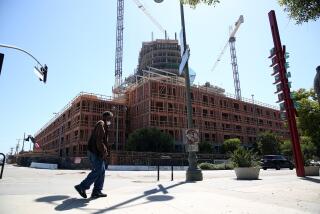Kaufman & Broad to Post 1st Annual Loss
Stung by a drop in real estate values, Kaufman & Broad Home Corp. said Thursday that it will take an after-tax charge of about $110 million related to some of its developments in California and France--a move that will result in the company’s first-ever annual loss.
Los Angeles-based Kaufman & Broad, the West’s largest home builder, said the write-down reflects the adoption of tougher accounting standards that require companies to value real estate more conservatively than in the past.
In addition, the charge will also help clear the way for the sale of many properties as part of a shift in company focus from long-term development to projects that can be completed relatively quickly.
Ironically, news of the write-off comes as Kaufman & Broad is enjoying a surge in sales and is expanding aggressively outside California. As of last week, companywide orders were up nearly 46% over last year, the firm said.
“From an operating standpoint, the business is performing well,” Bruce Karatz, Kaufman & Broad chairman and chief executive, said in a statement.
The company had indicated earlier this year that the adoption of the new accounting standards might have a material effect on the company’s financial results. The charge--which will be taken and result in a loss during Kaufman & Broad’s second quarter, which ends May 31--will not affect operations, the company said. The final size of the write-off will be announced at the end of June.
On the New York Stock Exchange Thursday, Kaufman & Broad stock eased 12.5 cents to close at $14.75 a share.
The write-down includes 16 properties in California--primarily undeveloped land in Southern California--that will account for an estimated $70 million to $75 million of the total charge.
In France, where Kaufman & Broad ranks as one of the largest residential developers in suburban Paris, the charge includes condominiums, retail and office projects.
While painful in the short run, the write-off and anticipated property sales will generate revenue to “pay down debt and invest in better opportunities,” said Michael Henn, the company’s chief financial officer.
Henn downplayed the drop in California property values as a major factor in forcing the company to take the charge.
“In general, we are optimistic for California and the prospects of doing more business here,” said Henn, adding that its properties have generated substantial interest among potential buyers.
But industry analysts say the state’s depressed real estate market, which only recently has shown signs of recovery, clearly played a role in the company’s decision.
“Their timing in buying the land was not good,” said one construction industry analyst who declined to be identified. “It’s remote [property] and away from urban areas.”
As California’s real estate market slowed dramatically during the early 1990s, Kaufman & Broad launched an expansion into Nevada and other Western states. Recently, the company entered the Texas market by acquiring land in the Dallas area and buying Rayco Ltd., the large home builder in San Antonio.
Last year, about 25% of all the homes Kaufman & Broad built were located in Western states outside California.
The company has also moved to focus on projects it can complete within 18 to 24 months instead of three to six years.
“If we are able to shift away from long-term development, we can reduce the risk of our business . . . and we are much better able to react to changes,” Henn said.
More to Read
Inside the business of entertainment
The Wide Shot brings you news, analysis and insights on everything from streaming wars to production — and what it all means for the future.
You may occasionally receive promotional content from the Los Angeles Times.










